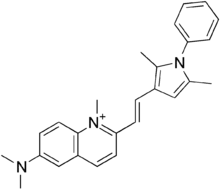Pyrvinium
Pyrvinium (Viprynium) is an anthelmintic effective for pinworms.[1] Several forms of pyrvinium have been prepared with variable counter anions, such as halides, tosylate, triflate and pamoate.[2][3] Pyrvinium was identified as a potent Wnt inhibitor, acting through activation of Casein kinase CK1α.[4][5]
 | |
| Clinical data | |
|---|---|
| AHFS/Drugs.com | Micromedex Detailed Consumer Information |
| ATC code | |
| Identifiers | |
IUPAC name
| |
| CAS Number | |
| PubChem CID | |
| ChemSpider | |
| UNII | |
| ChEBI | |
| ChEMBL | |
| CompTox Dashboard (EPA) | |
| ECHA InfoCard | 100.020.543 |
| Chemical and physical data | |
| Formula | C26H28N3+ |
| Molar mass | 382.531 g·mol−1 |
| 3D model (JSmol) | |
SMILES
| |
InChI
| |
Pyrvinium salts can also inhibit the growth of cancer cells.[6] More specifically, the pamoate salt has been shown to have preferential toxicity for various cancer cell lines during glucose starvation.[7]
Synthesis
One synthetic method is based on Skraup synthesis and Paal-Knorr synthesis.[6] More recently, an alternative convergent, synthetic strategy to pyrvinium triflate salts through Friedländer synthesis was reported.[3]
References
- Desai AS (December 1962). "Single-dose treatment of oxyuriasis with pyrvinium embonate". British Medical Journal. 2 (5319): 1583–5. doi:10.1136/bmj.2.5319.1583. PMC 1926864. PMID 14027194.
- "Pyrvinium". PubChem. U.S. National Library of Medicine.
- Mao Y, Lin N, Tian W, Huang Z (2012). "New Synthesis of Pyrvinium That inhibits the β-Catenin/Tcf4 Pathway". Heterocycles. 85 (5): 1179–1185. doi:10.3987/COM-12-12446.
- Saraswati S, Alfaro MP, Thorne CA, Atkinson J, Lee E, Young PP (2010). "Pyrvinium, a potent small molecule Wnt inhibitor, promotes wound repair and post-MI cardiac remodeling". PLOS ONE. 5 (11): e15521. Bibcode:2010PLoSO...515521S. doi:10.1371/journal.pone.0015521. PMC 2993965. PMID 21170416.
- Shen C, Nayak A, Melendez RA, Robbins DJ (2020). "Casein Kinase 1α as a Regulator of Wnt-Driven Cancer". International Journal of Molecular Sciences. 21 (16): 5940. doi:10.3390/ijms21165940. PMC 7460588. PMID 32824859.
- WO 2006078754, Macdonald JE, Hysell MK, Yu D, Li H, Wong-Staal F, "Novel Quinolinium Salts and Derivatives", published 2006-07-27
- Esumi H, Lu J, Kurashima Y, Hanaoka T (August 2004). "Antitumor activity of pyrvinium pamoate, 6-(dimethylamino)-2-[2-(2,5-dimethyl-1-phenyl-1H-pyrrol-3-yl)ethenyl]-1-methyl-quinolinium pamoate salt, showing preferential cytotoxicity during glucose starvation". Cancer Science. 95 (8): 685–90. doi:10.1111/j.1349-7006.2004.tb03330.x. PMID 15298733.
This article is issued from Wikipedia. The text is licensed under Creative Commons - Attribution - Sharealike. Additional terms may apply for the media files.